|
|
|
Sort Order |
|
|
|
Items / Page
|
|
|
|
|
|
|
| Srl | Item |
| 1 |
ID:
169999
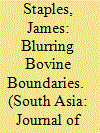

|
|
|
|
|
| Summary/Abstract |
Drawing on ethnographic fieldwork with butchers, cattle traders and beef eaters in South India, the aims of this paper are twofold. Firstly, it challenges two dominant assumptions made in respect of cattle slaughter and beef consumption in South Asia: one, that the beef trade directly concerns only Muslims, Dalits, Adivasis and Christians, and two, that respect for cattle is the near sole preserve of upper-caste Hindus. Secondly, given the strength of the empirical evidence against these two assumptions, it considers how such a stark framing of the debates along caste and communal lines has been sustained so successfully and for so long. Using insights from the anthropology of ignorance—to which this article makes a unique contribution—I argue that part of the answer lies in the strategic acts of not knowing what goes on at particular junctures along the chain from the cowshed to the dinner plate, which a number of different actors are complicit in working to maintain.
|
|
|
|
|
|
|
|
|
|
|
|
|
|
|
|
| 2 |
ID:
159755
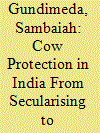

|
|
|
|
|
| Summary/Abstract |
Cow protection, a potent tool in the hands of cow vigilantes for atrocities against Muslims and Dalits, has become a heavily politicised issue in contemporary India. Its roots, connecting the themes of caste-Hindu religious sentiment, communalism and economic reasoning, can be traced to the late nineteenth century, though basic problems over the intriguingly complex use of cattle are clearly much older. This article relates contemporary cow protection debates specifically to Arya Samaj arguments against cow slaughter in the late nineteenth century and publication of a special issue of the journal Kalyan, titled Gau Ank, in 1945. The discussion shows how cow protection debates in the Constituent Assembly of India and in subsequent post-independence judicial verdicts were heavily influenced by these two earlier discourses. Analysing two landmark judicial decisions on cow slaughter, the article argues further that recent judicial endorsement of cow protection legitimises Hindu majoritarian sentiments in the law, while depriving millions of Indians, not just Muslims, of fundamental rights to food and livelihood. The conclusion attempts to consider some possible solutions to the current impasse.
|
|
|
|
|
|
|
|
|
|
|
|
|
|
|
|
| 3 |
ID:
161152
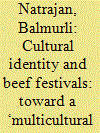

|
|
|
|
|
| Summary/Abstract |
Beef festivals are a dramatic and visible form of protest against the Indian government's ban on beef. These festivals are framed popularly as an assertion of Dalit ‘cultural rights’ and identity, with beef represented as the cultural food of Dalits. While it is clear that the beef ban is a casteist ban based on a Brahmanical food hierarchy, this paper explores the limits of resisting casteism through the assertion of caste-based cultural rights and identities, or as an assertion of an individual right to food choice. It argues that such a politics of resisting casteism runs into problems of the culturalization of caste, and limits the kinds of radical Dalit subjects and actors who could emerge as liberatory political subjects. The paper calls for reframing beef festivals as ‘antagonistic’ moments that articulate the degradation of Dalit labor in the politics of beef, reassert Dalit identity as an anti-caste identity rather than a cultural caste identity, and herald a politics of ‘multiculturalism against caste’.
|
|
|
|
|
|
|
|
|
|
|
|
|
|
|
|
| 4 |
ID:
091724
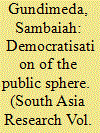

|
|
|
|
|
| Publication |
2009.
|
| Summary/Abstract |
Equality of treatment for all citizens and their cultures in public places is one of the prominent declarations of the secular Constitution of India. The hegemony of Hindu culture in the public sphere, however, reflects a dichotomy between stated declarations and social reality. Placing Dalits at the bottom of the caste hierarchy, if not outside it, 'mainstream' Hindu culture not only marginalised but importantly rejected the Dalits and their culture. This article examines the saga of the demand for a beef stall by the Dalit students in Hyderabad Central University and argues that the rejection of the culture of any community injures the human agency of that community. It is proposed that such injury can be healed only by a dialogical process, involving assertion of positivity and pride in the culture of the injured and positive recognition of such assertion by the injurer. Democratisation of the public sphere can be actualised by according representation to marginalised cultures, but in addition such representation needs to be accompanied with respect.
|
|
|
|
|
|
|
|
|
|
|
|
|
|
|
|
| 5 |
ID:
146879
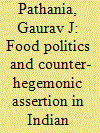

|
|
|
|
|
| Summary/Abstract |
Recently, heated debates concerning food politics have erupted at some of the most prestigious institutes of higher education in India. Students demand inclusion of beef and other meat in their hostel food menu, claiming hostel canteens represent only ‘mainstream’ Hindu culture. To boycott this culture and instil consciousness of their cosmopolitan life-world, they organise campus ‘Beef Festivals’ and publicly idolise so-called ‘demons’ of Hindu mythology. Using a Gramscian framework, this article explores the activism of marginalised students as counter-hegemonic and critically examines the ideological standpoints involved. As university spaces become significant sites to reinvent caste identities, we see that in their counter-hegemonic struggles, marginalised students employ the same tools and symbols of meat and myth as their opponents. It is argued that this strategy ultimately risks contradicting the goal of their activism and may block broader visions of an equal and just society.
|
|
|
|
|
|
|
|
|
|
|
|
|
|
|
|
|
|
|
|
|